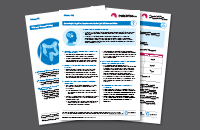 Full Guidelines
Full Guidelines
Click here to view article

 Tools
Tools


 Additional Documents
Additional Documents
Click here to see additional documents

This guideline update provides an evidence-based recommendation on depression screening in adults aged 18 years and older.
Key Recommendation
- We recommend against screening all adults aged 18 years and older for depression using a questionnaire with a cut-off score to distinguish “screen positive” and “screen negative” status (strong recommendation, very low-certainty evidence) based on evidence suggesting little to no effect of depression screening on health.
- This recommendation does not apply to adults with a personal history, current diagnosis, or clinical suspicion of a diagnosis of depression or another mental health disorder.
- This recommendation does apply to those who may be at an elevated risk of depression.
This recommendation emphasizes the importance of good clinical care, where clinicians ask about their patients’ well-being and remain vigilant for symptoms and signs of depression.
Methodology and Evidence
Our systematic review found moderate-certainty evidence that screening probably has little to no impact on symptoms of depression or health-related quality of life in one trial, and very uncertain evidence on the impact of screening in two other trials.
While no trials reported directly on harms of screening such as false positives, overdiagnosis, or overtreatment, screening accuracy data suggests it will lead to an increase in false positives, and may lead to unnecessary referrals and diagnostic evaluation, and overdiagnosis for some patients, reducing resources available for those with known mental health concerns.
Rationale
- This strong recommendation is based on moderate-certainty evidence that screening probably has little to no impact on symptoms of depression or health-related quality of life from one trial, and very uncertain evidence on the impact of screening from two other trials.
- While no trials reported on harms of screening such as false positives, overdiagnosis, or overtreatment, screening will lead to an increase in false positives, and may lead to unnecessary referrals and diagnostic evaluation, and overdiagnosis for some patients, reducing resources available for those with known mental health concerns.
- A meta-analysis using individual patient data gave accuracy information about a screening tool used in the trials we identified. The analysis estimates that screening 100 patients with the PHQ-9 using the common cut-off score of 10 would result in 9 true positives, 2 false negatives, 13 false positives, and 76 true negatives.
- Given the significant challenges to accessing mental health services in Canada, the unnecessary redirection of resources from the treatment of patients with mental health concerns could be an unintended harm of screening.
The task force is mindful of the resource constraints faced by our primary health care system and as such makes recommendations against interventions when the resource implication of a particular health intervention are certain to be important and benefits have not been demonstrated.
Additional Documents
ECRI Evaluation Scores
ECRI Guidelines Trust scores guidelines based on their adherence to the National Academy of Medicine Standards for Trustworthy Guidelines. Find the ECRI evaluation scores for this guideline here.
The Public Health Agency of Canada provided the following statement:
When the temporary pause of the work of the Task Force was announced in March 2025, some guidelines, such as the Recommendations on interventions for tobacco smoking cessation in adults in Canada, had already undergone stakeholder review and were submitted for publication. These finalized guidelines will continue through the publication process as per guidance from the Public Health Agency of Canada.



